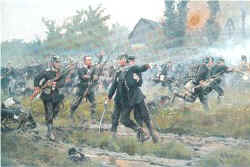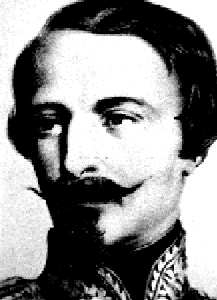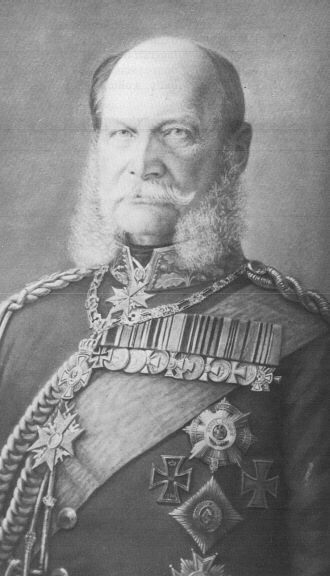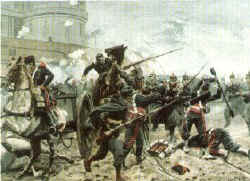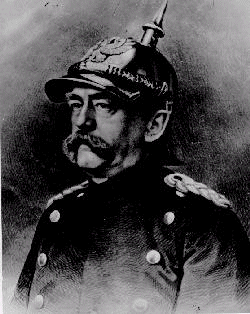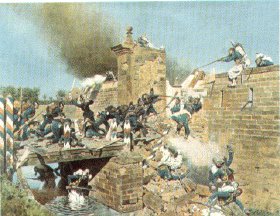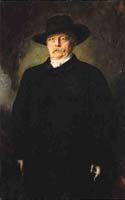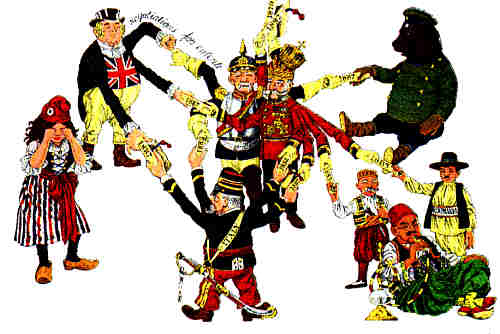 | ||
| What Really Caused WW I ? |
| World War One - The War To End All Wars |
A war, and a shift in the balance of power:
Before the Franco-Prussian War, Germany was a confederation of states in the north, a loose conglomeration of states in the south, and Prussia in the East. After easily winning the Austro-Prussian (aka The Seven Weeks) War of 1866 Prussia had replaced Austria as the leading Germanic Power in the aera. Otto von Bismarck Chancellor of Prussia was looking for a way to unify the whole of Germany.
At this time, France was protesting the offering of the Spanish crown to Prince Leopold, a member of the Hohenzollern-Sigmarinaen family, a relative of Wilhelm I, and a devout Roman-Catholic. France was trying to reduce the power and property of the Catholic Church, and feared that if Prince Leopold was allowed to become king of Spain the Hohenzollern family and the Catholic Church would have too much power. The balance in Europe would shift away from France. Under the rule of Napoleon III, the French sent Foreign Ambassador Count Benedetti to see Wilhelm I. Leopolds father had turned down the offer on his sons behalf, but this was not satisfactory for France. France wanted assurance that Leopold would never again try for the Spanish Crown.
Benedetti, with the French request, went to meet with Wilhelm I and Bismarck at the Ems River, where they were enjoying the waters. Wilhelm I refused Frances request, and Beneditti returned home having made no progress. Bismarck, trying to provoke war with France, published King Wilhelm I's conversation with Beneditti. This became known as the Ems Dispatch. Bismarck had edited the note to specifically provoke France. When the communication was made public on July 14, 1870, it enraged the French, and on July 19, 1870, France declared war on Prussia.
Under the brilliant leadership of General Helmuth Karl von Moltke (The Elder), the Prussian Army, joined by the German states, performed flawlessly in the field and out-maneuvered the French at every turn. At Wissenbourge, Woeth, and Spicheren, the Prussians inflected large numbers of casualties on the French. The war reached its apex at the Battle of Sedan, where the Prussian Army overwhelmed the French and they were forced to surrender. Among those captured, was none other then Emperor Napoleon III. After the news reached the people of France, the government deposed Napoleon and began to prepare for the siege of Paris. What was left of the Army and the citizens of Paris tried in vain to stop the Prussians, but it was no use. After 5 months, the brave French defenders had run out of supplies and were forced to eat cats and dogs to stay alive. On May 10 1871, the head of the new, German-recognized government, Louis Thiers, signed the Treaty of Frankfort. The war was finally over. Bismarcks plan had worked. The Franco-Prussian war had brought the whole of Germany together to form a nation. Now was the birth of a unified Germany.
Germany was in the seat of power and Bismarck demanded harsh restitution for the war. The greater part of Alsace Lorraine was taken by Germany. A further indemnity of one billion dollars was also to be paid with in three years, and until all the money was paid, a German occupation force remained in France. Thanks to foreign loans, France was able to pay the money in less than the three years set out in the treaty. To add to the humiliation, the Germans marched in triumph through the streets of Paris and by proclamation of the new Kaiser, King Wilhelm I of Prussia, in the French royal palace at Versailles, Germany had been declared an empire. The French never forgot their hatred for these acts, not even after World War I.
The Franco-Prussian war left a legacy that was far-reaching. The third French republic was formed. Without Napoleon to protect the Papal States, they were annexed by Italy. France wanted revenge, and revenge dictated their policy for the next half century.  The Alliances Bismarck takes charge:
After the German defeat of France in the Franco-Prussian war of 1870-1871, Germany became a unified state. Under the leadership of their chancellor Otto von Bismarck and the military guide of the great general von Moltke The Elder (the uncle of latter chief of staff von Moltke The Younger), Germany became the foremost power on the European continent. Italy at this time was making claims to certain Italian speaking areas of Austria-Hungary such as the Trentino district and areas along the Dalmatian Coast. However, Italy was not ready to go to war over these areas just yet. She had her newly won gains in Venetia and the Papal States to consider. Italy and Germany had further ambitions, but both countries wanted to preserve the status quo their diplomats and armies had recently procured. Germany and Italy, both newcomers to European diplomacy, were eager to hold on to their gains. But Germany, being the more powerful of the two, was in a position to dominate. Germany needed time to consolidate her newly won territory, so Bismarck set out to create stability in Europe. His first diplomatic mission was to Austria-Hungry, which Prussia had soundly trounced in 1866. Germany had run into a snag in diplomatic relations with Austria. Austrian foreign minister Beust was an extreme anti-Prussian and was unwilling to work with Germany. Austria desperately needed stability in the area, so in September of 1872 Austrian Emperor Franz Josef fired Buest and appointed a pro-Prussian Julius Andrassy (a Hungarian count) in his place. The way was paved for an alliance with Germany and Austria. Germany realized that Austria-Hungry and Russia were the key to their security in the east so, in September 1872 Bismarck and Kiser Wilhelm I invited Austro-Hungarian Emperor Franz Josef and foreign minister Count Julius Andrassy, Tsar Alexander II of Russia, and his foreign minister Prince Gorchakov to a secret meeting in Berlin to pave the way for a triple entente. Bismarck knew that if France were allowed to form an alliance with Russia Germany would be faced with a two-front war she could never win. Throughout Bismarcks time as Chancellor he continued to prevent France from forming an alliance with Russia, and by 1873 it looked like his work had paid off. In a political and military convention known as the Three Emperors League (May 1873) held in St. Petersburg Russia, Germany and Russia agreed to send 200,00 troops to the aid of the other if they were attacked by another European power. In June of 1873, a more general agreement was reached in Vienna in which Austria and Russia promised, with German approval, to confer if either was threatened by another power. Bismarcks diplomatic aim was to isolate France from Europe. When Italy, feeling her own security threatened, gravitated towards the Three Emperors League, although she was determined to stay neutral at this time. A grim cloud was darkening the sky of Europe when in 1875 a revolt of Serbian nationalists in Bosnia-Herzegovina became the spark of uprising in the Balkans against Turkish misrule. To prevent Austrian intervention, Russia decided to strike the Ottoman Empire alone in 1877, coming to the aid of her Slavic brothers. The end result of the Russo-Turkish War was disastrous. The San Stefano Treaty (January1878), which ended the conflict, gave Russia a dominant power in the region. The treaty stripped Rumania of Bessarabia and Russia took this area as compensation while the treaty formed Serbia, Montenegro, and Bulgaria. Austria-Hungry was not compensated at all by the treaty and threatened to go to war with Russia if the treaty of San Staffano stood. Bismarck once again stepped in and quelled the situation. He called a conference in Berlin to restore peace between Germanys allies. Bismarck played the ends against the middle trying to make all sides happy. The agreement, known as the Congress of Berlin Agreement, resulted in reduction of Bulgarian territory, the independence of Serbia, and Montenegro being recognized by Turkey. He also gave Austria compensation by allowing them to occupy and adminster Bosina-Herzegovina under Turkish rule, a formula to give Austria-Hungry control over these southern Baltic states and allow Turkey to save face. So much for Serbian and Montenegrin independence. France, not being consulted in this, had their pride damaged, so Bismarck allowed France a free hand in Tunisia and last, but not least, the British. The Congress of Berlin gave Briton control of Cyprus. Germany and Italy took nothing. Bismarck was pleased by his work and he had diverted war, but Italy was unhappy it had received nothing, which it thought to be an oversight. Bismarck thought he had European bliss, but he found out his work had just begun.
Mending Fences
Bismarck now set out to repair his alliances in the east. The Russo-Turkish war had caused a great riff between Russia and Austria-Hungry. The Russians were displeased with the way Bismarck had altered The Treaty of San Stefano, giving Austria-Hungry the right to "occupy and administer" Bosnia-Herzegovina. Since both countries were allies of Germany he knew he had to find a way to settle the matter before it was too Almost as soon as The Congress of Berlin Was over Bismarck turned to Austria-Hungry. Austria was already in good standings with Germany and Bismarck felt, although Austria's army was smaller than Russia's, they were better equipped with modern weapons of destruction. Kaiser Wilhelm I insisted that solidarity be kept with Russia (Wilhelm I was closely related to AlexanderII). Bismarck knew Russian foreign minister Gorchakov was upset about the way Bismarck had helped Austria - Hungry gain Balkan territory with the Congress of Berlin, and would not look favorable on German overtures. Bismarck pushed ahead his talks with Austro-Hungarian ambassador Andrassy, and in 1879 the two powers signed the Austro-German Alliance. This alliance was the longest of Bismarck's career and it stated if either power was attacked by Russia the other would come to their aid, and neither side Bismarck had an ace up his sleeve that he thought just might bring Russia to his side once again. A part of this agreement stated that if either party was attacked by an outside power (namely France) the other power if not lending aid would at least stay neutral. Bismarck hoped with the threat of a foreign power outside the area,(Dangled in front of Russia like a carrot in front of a mule) this would bring them to join the alliance. Despite the fact the alliance was supposed to be secrete, the Russians found out before Bismarck was ready. Even with this bad luck he had an alliance with Austria. Now if the Russians signed a Russo - French alliance Germany would not have to stand-alone. Much to the good fortune that followed Bismarck through out his career, the Russians were in no hurry to sign an alliance with France. So Russia turned to Germany and in 1880 she asked for a treaty of her own. Gorchakov was furious so his duties were transferred to a pro -German named Nicholas de Giers, who boosted of having Germanic blood. Bismarck made it very clear to the Russian Government that any alliance signed between the two would not stand on it's own but it would be a supplement to the earlier Austro - German alliance. The new foreign Minister de Gires wanted this treaty badly so he didn't object to Austria's inclusion. Austria however was not so happy about an alliance with Russia. Feelings were still strong over the recent Balkan matters and Austria was happy with her treaty with Germany, She saw no need to renew the DreiKaiserbund just yet. |
|||||||||
|
|
|||||||||
|
|
|||||||||
| |||||||||
